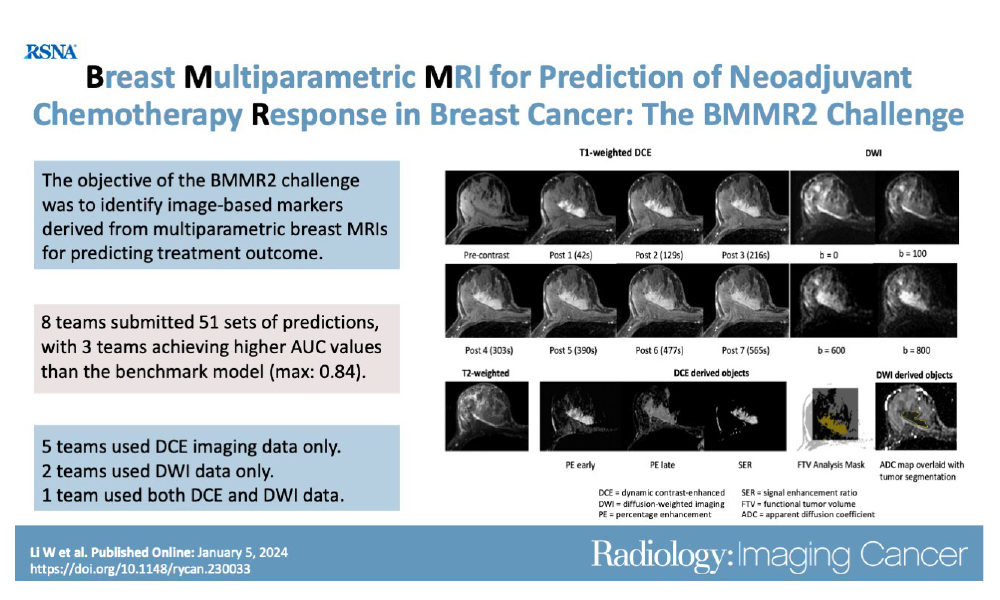The Predictive Power of Multiparametric MRI in Breast Cancer
 Wen Li, PhD associate professional researcher at the Department of Radiology and Biomedical Imaging at UCSF, is first author of “Breast Multiparametric MRI for Prediction of Neoadjuvant Chemotherapy Response in Breast Cancer: The BMMR2 Challenge” published in Radiology: Imaging Cancer. Breast cancer is the most common cancer worldwide, which is why the BMMR2 Challenge assembled eight teams from four countries to develop imaging-based models with high performance for predicting response to neoadjuvant chemotherapy for breast cancer.
Wen Li, PhD associate professional researcher at the Department of Radiology and Biomedical Imaging at UCSF, is first author of “Breast Multiparametric MRI for Prediction of Neoadjuvant Chemotherapy Response in Breast Cancer: The BMMR2 Challenge” published in Radiology: Imaging Cancer. Breast cancer is the most common cancer worldwide, which is why the BMMR2 Challenge assembled eight teams from four countries to develop imaging-based models with high performance for predicting response to neoadjuvant chemotherapy for breast cancer.
The BMMR2 teams, from academia and industry, aimed to leverage the power of artificial intelligence to analyze multiparametric MRI data and predict early treatment response in patients undergoing neoadjuvant chemotherapy. The rich data set, generated from the ACRIN 6698 trial — a sub-study of the I-SPY 2 trial encompassing longitudinal diffusion-weighted (DWI), dynamic contrast-enhanced (DCE), and T2-weighted images, were shared through the Cancer Imaging Archive (TCIA) to BMMR2 teams and are now available to the general public.
The eight teams, armed with diverse methodologies ranging from extraction of individual features to deep learning and artificial intelligence methods, incorporating DCE and DWI alone or in combination, used logistic regression, support vector machines, and other algorithms to extract hidden features within the MRI data, transforming them into predictive insights.
The results were encouraging. The benchmark established by the ACRIN 6698 trial – a logistic regression model combining mean tumor apparent diffusion coefficient measured from DWI with a single clinical parameter – demonstrated respectable performance. Even so, several teams surpassed it.
Notably, one team achieved results exceeding the benchmark by a significant margin using only diffusion-weighted imaging data. This highlights the potential of diffusion-based imaging as a standalone predictor, simplifying workflow and potentially avoiding patient exposure to contrast agents.
Beyond standardized protocols lies the promise of personalized therapy, tailored to individual patients’ responses. The BMMR2 challenge shows the possibility of combining AI with human collaboration to propel us closer to a future where AI and multiparametric MRI together guide the future of breast cancer treatment, one personalized step at a time.

